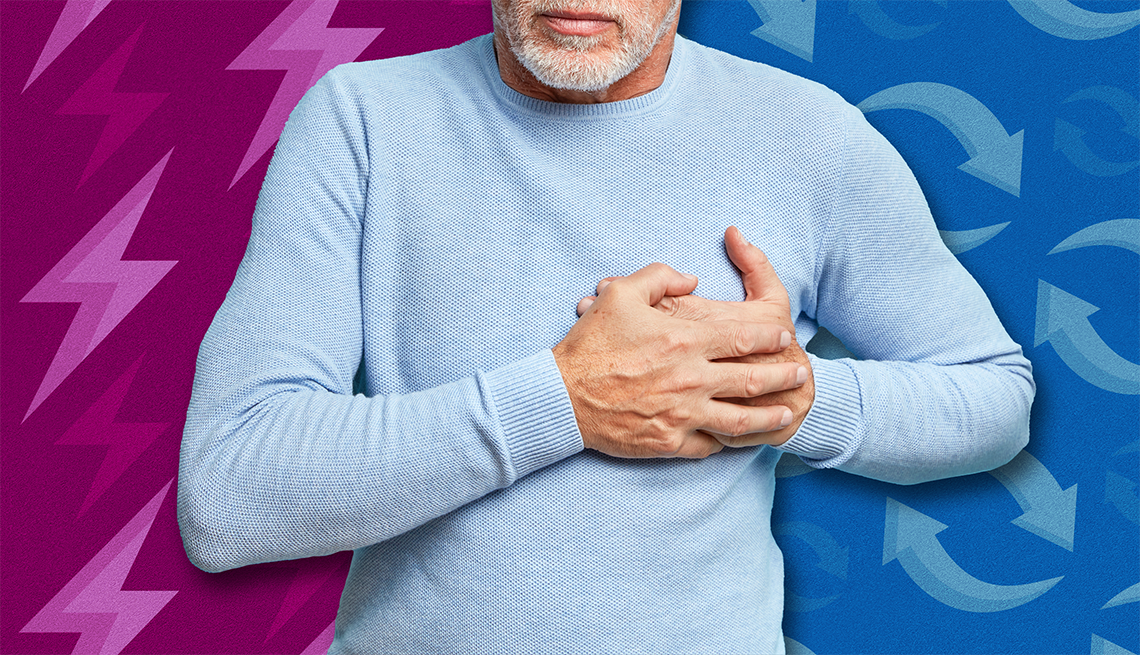
The difference between heart attack and cardiac arrest
- Select a language for the TTS:
- UK English Female
- UK English Male
- US English Female
- US English Male
- Australian Female
- Australian Male
- Language selected: (auto detect) - EN
Play all audios:

Sometimes heavy alcohol use or drug use can trigger cardiac arrest. So can severe stress, a blow to the chest (this is what recently happened to NFL player Damar Hamlin) and respiratory
arrest, or when a person stops breathing. _ARE THERE WARNING SIGNS AND SYMPTOMS OF CARDIAC ARREST?_ Unlike many other health issues, there aren’t usually any signs or symptoms to warn an
individual that cardiac arrest is imminent, though some people may experience chest pain, nausea, vomiting or shortness of breath before losing consciousness. “People may get no warning
whatsoever,” Katz says. _WHAT SHOULD YOU DO?_ If you see someone in cardiac arrest, “the immediate thing that you do is you start chest compressions, and you call 9-1-1,” Katz says. Starting
CPR — which helps keep blood flow active until emergency responders arrive — “really is the difference between somebody having a good outcome versus a tragic outcome,” he says. About
350,000 people die from cardiac arrest every year in the U.S., and less than half of people who experience cardiac arrest outside the hospital receive the right care from bystanders. The
American Heart Association says anyone can perform CPR with hands-only chest compressions (no need for mouth-to-mouth unless you’re trained and feel comfortable doing it). Push hard and fast
in the center of the chest to the beat of “Stayin’ Alive” by the Bee Gees or another song that is equivalent to about 100 to 120 beats per minute. And if an automated external defibrillator
(AED) is available, use it. These portable devices that can often be found in public places such as airports and malls can stimulate the heart to resume beating. HEART ATTACK VS. CARDIAC
ARREST A quick way to remember the difference: Cardiac arrest is an “electrical” problem * If you see someone going into cardiac arrest, call 911 and start CPR right away. Heart attack is a
“circulation” problem * If someone is having a heart attack, call 911. _Source: American Heart Association_ Smith considers herself fortunate that her cardiac arrest — which her doctor says
was possibly caused by a ventricular fibrillation, or an irregular heartbeat, and may have been brought on by stress — occurred inside a hospital. She now has a small device known as an
implantable cardioverter-defibrillator in her chest to detect and correct any irregular heartbeats that could cause this to happen again. HEART ATTACK _WHAT IS A HEART ATTACK?_ Unlike with
cardiac arrest, the heart is still pumping when a person has a heart attack; it’s just that the heart is under stress, says Mistyann-Blue Miller, M.D., a cardiologist with Cleveland Clinic
in Vero Beach, Florida. And that’s because blood flow to the heart is being blocked. If this blood flow is not restored quickly, the oxygen-starved heart muscle will start to die. _WHAT
CAUSES A HEART ATTACK?_ Most heart attacks are caused by coronary artery disease, according to the NHLBI, or plaque buildup along the walls of the arteries that supply blood to the heart.
Cholesterol and other fatty substances can lead to this buildup. A number of modifiable factors can increase your risk for coronary artery disease, including physical inactivity, unhealthy
eating, smoking and being overweight, according to the Centers for Disease Control and Prevention. Other risk factors include a family history of heart disease.
